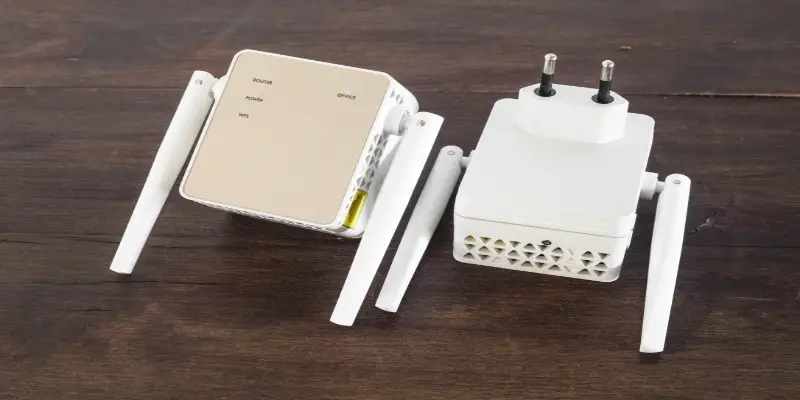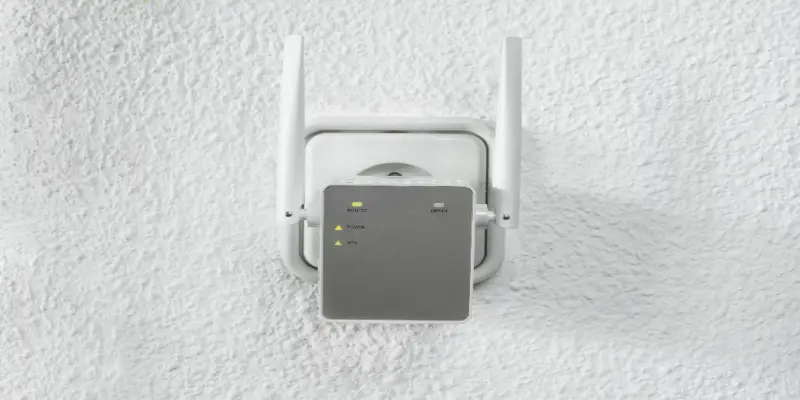Disclaimer: This post may contain affiliate links, meaning we get a small commission if you make a purchase through our links, at no cost to you. For more information, please visit our Disclaimer Page.
Ethernet extenders are a great way to get a wired connection in a remote part of your house.
Ethernet extenders don’t slow down internet speed because they have a strong connection that isn’t prone to interference. However, other factors such as slow ethernet cables, can be responsible for slow internet speed. You can fix it by restarting your device or network adapter, etc.
Ethernet extenders are useful for transmitting data over long distances. Below are how Ethernet extenders work, how to enable them, and how to fix slow internet speed.
Table of Contents
What Is An Ethernet Extender? How Does It Work?
An Ethernet extender is a device that connects two Ethernet cables. It is also called an Ethernet coupler, a LAN extender, or a network extender and can either be active or passive. It uses electrical means to extend your Ethernet line.
An Ethernet extender works by expanding and maximizing your Ethernet network. It is both cost-effective and efficient, as you can use copper wiring you already have. Generally, Ethernet cables can’t transmit data beyond hundred meters, but an Ethernet extender enables data transmission up to twenty kilometers.
In addition, an Ethernet extender enables a higher internet speed. It works for both managed and unmanaged Ethernet networks. Its operations are transparent, so you can account for everything you do with your ethernet network.
How To Enable An Ethernet Extender?
An Ethernet extender is a plug-and-play device you can easily enable. To enable your Ethernet extender, ready the connection hub that came with your computer. You have to connect one end of your Ethernet cable to the connection hub.
After, connect the other end to the Ethernet port on your extender. Ensure both ends of the Ethernet cable are firmly attached to the respective devices before you plug the extender into a power source. Plug the connection hub to a power source as well.
If the connection is made correctly, the signal lights on the connection hub and extender will come on. However, the color of the signal lights depends on the type of devices you are using. To know the kind of signal lights you should be expecting, check the user manual.
Do Ethernet Extenders Slow Down Internet Speed?
An Ethernet extender doesn’t slow down your internet speed. It has a strong internet connection that isn’t susceptible to lag in the first place. It uses the electrical cables in the thick walls of your home to aid its internet connection.
As such, Ethernet extenders are one of the best options for extending your Ethernet network. However, ensure your devices are working correctly, and your internet connection isn’t a bottleneck. Also, ensure the extender is enabled correctly.
Even if your Ethernet extenders work correctly, other factors can be responsible for a slow ethernet connection. Once you notice that your Ethernet network isn’t working as fast as expected, you can use the fixes below to restore your internet connection.
After checking that your Ethernet extender is connected correctly, reboot your computer. Rebooting your computer can fix the network and hardware issues. It also makes your computer run smoothly and is the simplest method for troubleshooting a problem.
If the connection is still slow, reset your network adapter. Sometimes, your adapter might refuse to work well with the Ethernet. As such, you have to disable your Ethernet connection for some time before you reconnect it again.
With this, your internet connection should work correctly. You can also use the troubleshooter on your network adapter to scan for and fix any problems. Ensure you select your Ethernet connection when the troubleshooter asks for the specific adapter to be checked.
If there are any problems, the troubleshooter will notify you. If there are, the troubleshooter will fix it if it can or suggest a solution. Either way, ensure you don’t interrupt the troubleshooting process.
Your connection hub might also be the cause of your slow internet speed. Restart the hub by switching it off for some time before turning it on again. If your connection hub doesn’t have a switch you can turn on and off, pull out the power plug and reconnect it to the power source after some time.
Under normal circumstances, your internet connection should be restored once you restart the connection hub. However, if it doesn’t, you might have to check for malware in your connection hub. Most times, connection hubs are hacked by people who want to spy on your online activities or freeload off your internet connection.
If you notice that your internet activities are redirected where you don’t intend, passwords aren’t working, applications on your computer crash randomly, too many popups appear on your screen, or you find new software you’ve not installed on your computer, your connection hub has been hacked. If your connection hub is hacked, you are exposed to different problems.
To secure your connection hub, install a strong antivirus. Change your passwords as well; ensure they are difficult for other people to guess easily. You can use a password manager if you can’t cope with remembering all your passwords manually.
For added security, enable the two-factor authentication setting and don’t click on any unverified links you come across.
If your internet connection still doesn’t work, you might have to use a different connection hub or Ethernet cable. Ethernet cables can also affect internet connection because their rating determines their output. For instance, modern Ethernet cables have higher outputs than the old ones.
If all of the fixes explained above don’t work, you might have to consult a technician.
What To Consider When Choosing An Ethernet Extender?
Not all available Ethernet extenders are the same. For this reason, the quality of the Ethernet extender you use determines its efficiency. Before you choose an Ethernet extender, here are some things you should consider.
The specifications of your router or connection hub determine the type of Ethernet extender you should buy. For instance, an extender and connection hub that has the same frequencies would work efficiently together. Also, ensure the extender you choose has a microcontroller that can detect errors and recover connections.
Also, check the quality of material used to house the extender’s wires as it determines the level of protection the extender has in any environment. Metal is better as it can withstand corrosion. If your extenders have plastic housing, ensure the plastic is of high quality.
In addition, the category rating of the extender matters. This determines the amount of bandwidth your extender can support, and by extension, how fast your internet connection will be. Choose the extender with an output that best meets your requirements.
The number of Ethernet ports available on your ethernet extender is crucial too. Most extenders have two ports which might not be enough if you need to connect multiple devices. As such, you should go for desktop-based extenders.
In terms of physical outlook, you have to choose from plug-based or desktop-based extenders. Extenders can also have dual or more antennas or no antennas at all. Usually, the amount of space in your home determines what you choose.
For a plug-based Ethernet extender, all you need is a wall socket. For desktop-based extenders, you need more room as you have to position them on a flat surface. For extenders with external antennas, you also need more space in setting them up.
Furthermore, you want to get the extender with the highest level of security. Wired networks are prone to malware and other problems too. To keep your Ethernet network safe, ensure you regularly update it and use components you can easily configure.
Keep your extenders and other components out of reach when you’re not using them, especially in public places. This will discourage other people with bad intentions from making use of it.
Finally, consider the cost when choosing an Ethernet extender. Usually, the higher the quality of the extender, the higher the cost. For example, a plug-based extender will be cheaper than a desktop-based extender.
Conclusion
If you need to extend your ethernet connection over a long distance, an Ethernet extender is a great option. It maximizes your network and doesn’t cause your internet speed to lag. For optimum performance, ensure you use a good Ethernet extender.


